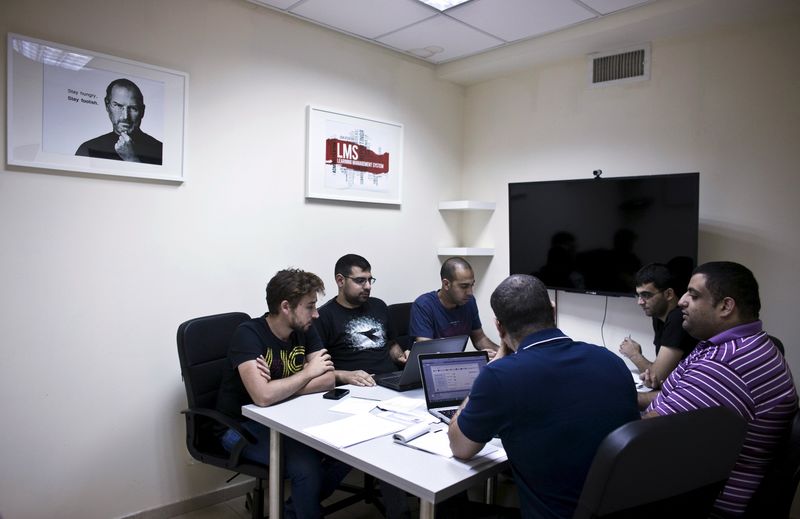By Tova Cohen
TEL AVIV (Reuters) - Israel's Arab minority is seeking its share of high-tech success in a "start-up nation", a quest that has already turned Jesus's boyhood town of Nazareth into an incubator for innovation.
But scarce funding, long-entrenched discrimination and the disadvantage, in Israel, of not serving in its military are all obstacles the Arab community faces in breaking new ground.
Over the past decade about 7,000 tech companies have been founded in Israel, where high-tech goods and services account for 12.5 percent of gross domestic product.
Only 30 Arab-led tech firms, however, the majority of them in software, are generating revenue, according to Israel's Economy Ministry. For example, SolidRun makes small cube-shaped computers sold through distributors in Europe and Australia and throughout the world over the Internet.
There are also several dozen, pre-revenue Arab start-ups, focused on the natural sciences, medical devices, hardware and Internet, mostly in Nazareth.
An official source said that from 2010-2015 the Israeli government budgeted $739 million to economic development of the Arab sector including tech entrepreneurship, of which the most notable initiatives are in Nazareth, Israel's biggest Arab town.
"We are seeing more Nazareth-based start-ups thriving," said Fadi Swidan, director of the government-funded Nazareth Business Incubator Centre (NBIC). Microsoft, IBM (NYSE:IBM) and others provide free services to the new companies.
But access to start-up funding, especially from key private sources, has often been the biggest challenge: Nazareth, is a 90-minute drive from Tel Aviv, the country's main commercial centre, and not on the radar of most investors.
And with few Arabs in Israel's army, the source of much of the country's innovation, they cannot tap into relationships built during military service that help many Jewish entrepreneurs. For their part, Arab investors prefer more traditional investments, such as real estate.
"Entrepreneurs in Nazareth can be the bridge between Israel and 400 million Arabs (around the Middle East)," said Palestinian businessman Abdul Malik Al Jaber, a former CEO of telecoms provider Zain Jordan and founder of MENA Apps, which invests in start-ups in the region.
"Imagine if you have a joint Israeli-Palestinian investment in a start-up and it is sold for $1 billion like (Israeli navigation app) Waze. Imagine the impact this would have on the peace process," said Malik, who invested in start-up Edunation, a social-learning platform targeted at universities in Arab countries.
Peace negotiations between Israel and the Palestinians have been frozen since April last year.
Some 2,200 Arabs worked in high-tech in Israel at the end of 2014, many in the northern offices of large firms such as billing software provider Amdocs.
Change can already be seen at the Technion University in the northern Israeli city of Haifa. Often referred to as the MIT of Israel, about 21 percent of its undergraduate students in 2014 were Arab - the same proportion as in Israel's overall population of 8.3 million, and up from 11 percent in 2001.
VISIBILITY
Since its founding in 2012, the NBIC has worked with 70 Arab companies, of which a fifth have secured outside funding.
Whilst some graduates of the Nazareth incubator are standing on their own feet, there is still no "success storey" like a company acquired for a large sum, said Swidan.
He pointed to Maktoob, an Arab-language portal from neighbouring Jordan acquired by Yahoo in 2009, as the type of success to which Israeli Arabs should aspire.
Swidan is trying to increase the visibility of Arab firms by attracting them to economically thriving central Israel to meet potential investors, such as at an event near Tel Aviv last week sponsored by the U.S. Embassy.
One such company is Optima Design Automation, which develops software to solve the problem of "soft errors" -- nuclear particles that disrupt the operation of electronic chips.
Optima secured a grant from the Israeli Chief Scientist's Office -- which funds 85 percent of research at Arab-led start-ups compared with the usual 50 percent it allocates to other companies. Its technology is being validated by a chipmaker in California's Silicon Valley.
Jamil Mazzawi, Optima's founder, said discrimination faced by Arabs in the sector has diminished in recent years.
Although he found a job in 1993 after studying computer engineering at the Technion University, many Arab engineers couldn't find employment and turned to teaching or moved abroad.
Government programmes to encourage tech firms to hire Arabs have begun to bear fruit in the past five years and Mazzawi said it is much easier now for Arab engineers to land a job. But for entrepreneurs raising investment, conditions remain tough.

"I am funding my company for over two years from my own money," he said.
